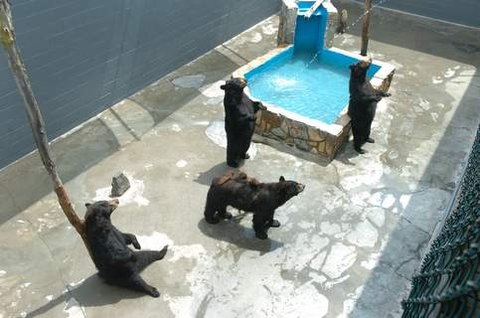Please join Misty in asking Cherokee and federal officials to close the bear pits for good.
Frozen River and Big Love Actor Misty Upham Says Bears Are Subjected to 'Years of Torture'
Upham, who grew up on the Blackfeet Reservation in Montana, also says, "Anybody who goes anywhere to feed an animal who's being kept in a space where … there's nowhere else to go, I think they're all in a huge denial of what they owe the land."
In the interview, Upham also talks about animals who are carted around by exhibitors (the animals are subjected to "psychological torture") and describes how dogs helped her in therapy for sexual abuse.
TV icon Bob Barker has also spoken out against keeping bears captive as tourist attractions. Recently, PETA filed a complaint with the U.S. Department of Agriculture (USDA) against Chief Saunooke Bear Park in Cherokee after a 9-year-old girl was bitten by a captive bear—it was the second bite by a bear at the facility in one week. Since then, the facility has also been cited by the USDA for failure to provide veterinary care, failure to separate incompatible animals, failure to maintain facilities to protect the animals from injury, and reusing dirty paper trays to feed the bears.
For more on the subject, see PETA Billboards: "Avoid Cruel Bear Pits" and Bear Pits = Boarding Schools.


5 comments:
The real problem with PETA is that the veganopia they imagine gives Indians diabetes. Granted, even imagining a veganopia is enough to give most people diabetes, but still...
Sorry, could you explain the difference between Blackfeet and Black Foot, please?
I'm all for humane treatment of animals, but I disagree hugely with PETA's views
Well also Anonymous # 1, PETA wants total animal liberation. Meaning no animal research for cancer or deadly diseases and viruses. This also means no insulin, which makes PETA's own founder Ingrid Newkirk a hypocrite because she wants to abolish it, but needs insulin so she can live.
Not only that, but pretty much all animals with the exception of cats will most likely become extinct when liberated. This is because domesticated animals have been genetically altered, altered so that production is high but survival is unlikely.
I don't see anything about "total animal liberation" in PETA's mission statement (below). Sounds like anti-PETA propaganda to me.
http://www.peta.org/about/default.aspx
Our Mission Statement
People for the Ethical Treatment of Animals (PETA) is the largest animal rights organization in the world, with more than 2 million members and supporters.
PETA focuses its attention on the four areas in which the largest numbers of animals suffer the most intensely for the longest periods of time: on factory farms, in the clothing trade, in laboratories, and in the entertainment industry. We also work on a variety of other issues, including the cruel killing of beavers, birds, and other "pests" as well as cruelty to domesticated animals.
PETA works through public education, cruelty investigations, research, animal rescue, legislation, special events, celebrity involvement, and protest campaigns.
Blackfeet and Blackfoot (not Black Foot) are related terms, Kat. But the tribe in Montana calls itself the Blackfeet.
http://en.wikipedia.org/wiki/Blackfeet
The Blackfeet are closely related to three First Nations in the Canadian province of Alberta. All speak dialects of the Blackfoot language. These First Nations are the Kainai Nation (formerly the Blood), the Northern Peigan and the Siksika Nation. These First Nations and the Blackfeet are sometimes collectively referred to as the Blackfoot or the Blackfoot Confederacy. Ethnographic literature most commonly uses "Blackfoot people," and most Blackfoot people use the singular Blackfoot. The US and tribal governments officially use "Blackfeet," as in Blackfeet Indian Reservation and Blackfeet Nation, as seen on official tribe website.
Post a Comment